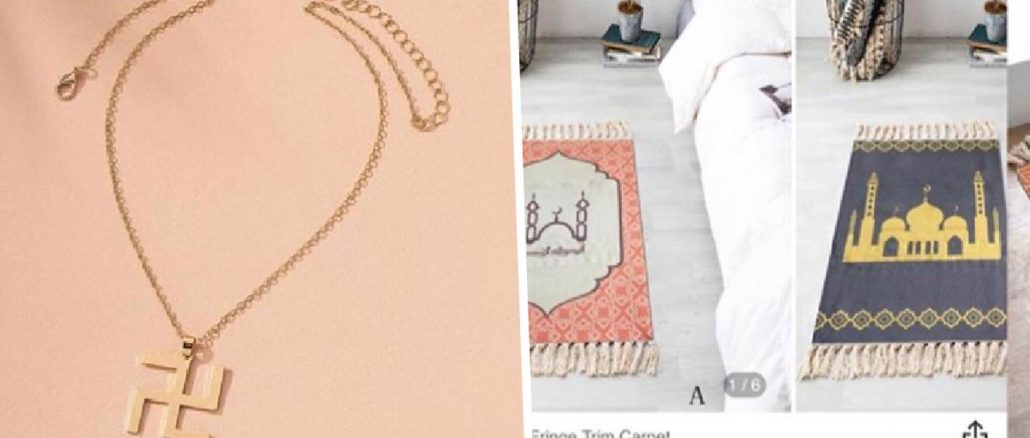
[dropcap]T[/dropcap]he lines between faith and fashion, between appropriation and appreciation, have been blurred for the second time in just one week by online fashion retailer SHEIN.
The Nanjing-based company in China is yet again caught in the crossfires between retailing items with deep religious and historic connotations, and disregarding what this might mean for its culturally diverse clientele in the 220 countries it retails to, according to its website.
SHEIN initially made headlines on July 3rd when attention was drawn to the rugs being sold that bore an unmistakable resemblance to Islamic prayer mats. Illustrations such as mosques and the Kaaba (the most sacred site in Islamic culture) were visibly depicted on the rugs that were listed as “fringe trim Greek fret carpets”.
Two days later, the fast-fashion merchant issued an apology on Instagram that only resonated with yet more incognizant undertones.
According to its social media apology, the items were removed from the site and the company had formed a “product review committee with staff from different cultures and religions so a mistake like this doesn’t happen again.”
Just one week later, SHEIN entered similar territory when a pendant Swastika necklace was listed on its site. The company removed the product and issued another apology, defending its position by referring to the necklace in terms of its Buddhist symbolism.
“The Buddhist symbol has stood for spirituality and good fortune for more than a thousand years, and has a different design than the Nazi swastika which stands for hate – but that doesn’t matter because we should have been more considerate,” the statement read.
The swastika originated in ancient Indian culture and is synonymous with well-being and good fortune, used largely by Buddhist, Hindus and Jains.
By the 19th century, the symbol was adopted in the Western world and appropriated by the Nazi regime to strike a reign of terror and hatred, according to BBC. Based on the direction the symbol is tilted, the necklace can take on an extremely different meaning.
The company, owned by businessman Chris Xu, vowed to cease the sale of any religious items on its site, according to the statement.
Faith and fashion have repeatedly crossed paths and is continuously becoming normalised in the fashion world. This makes it harder for fashion conglomerates to avoid appropriating a culture or religion to monetise it.
In its 12th year of production and having experienced the level of cultural appropriation that has swept through the fashion industry to date; the turban-style headwear that featured in Gucci’s runway show in 2018 and the cornrow wigs worn by Comme Des Garçons models during Paris Fashion Week in January, SHEIN’s lack of oversight weighs heavily.
The company’s growing digital footprint is largely due to the introduction of new stock to the site every single day, according to its website, which also states “SHEIN is able to stay on top of the latest fashion trends from around the globe while rapidly bringing these styles to market..at appealing prices to every user around the world.”
The average price point of items on the site is below €20. The questionably low prices and the daily churn of new trends uploaded to the site leaves the company susceptible to overlooking – or possibly neglecting – ethical measures to ensure all products are appropriate and inoffensive to the diverse culture and ethnicity represented by its customers.
In recent weeks, the company removed the sale of certain garments from its site which punctuated a striking resemblance to traditional South Asian attire.
These items were described as “tribal” and “boho”, disregarding the correct terms for the items in South Asian culture, being a kurta and a salwar kameez, according to Shades of Noir, an online resource for race and cultural equality.
A company that is perched in the cosy confines of the online world must realise the onus it has in representing its continuously growing online clientele.
The blind eye it has previously thrown to cultural appropriation will no longer be accepted by its 11.5 million Instagram followers. It simply has to stand up and do better in our modern 2020 landscape.
Author: Trudy Feenane
Image Credit: SHEIN



